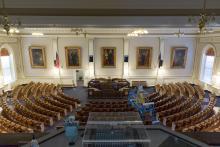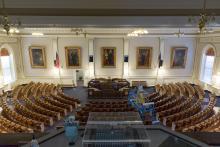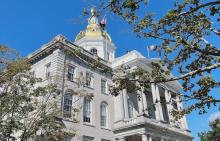What’s next? Your local library issuing a subpoena to people who are late in returning a book?
Anyway, Liberty Alliance member Rep. Bob Lynn R-Windham, (he of the many voter suppression bills) is now looking to give New Hampshire’s Dept. of Education the power to issue subpoenas. HB 520 is a bill meant to “authorize hearing officers of the department of education to issue subpoenas.”
“XIII. The commissioner or the commissioner’s designee is authorized to seek subpoenas for persons, and for books, papers, documents and other items for the purpose of carrying out investigations pursuant to the code of conduct for New Hampshire educators, as established by RSA 21-N:9, II(cc)(1).
(a) In seeking a subpoena, the department shall present the reasons for seeking such subpoena to a hearings officer, who shall issue the subpoena if the hearings officer finds that:
(1) The subpoena is sought in good faith for the purpose of investigating a violation or possible violation of the educator code of conduct by a certified educator; and
(2) The information sought by the subpoena appears reasonably likely to be material and relevant to the investigation.”
It goes on. This is how a police state begins. Education Commissioner Frank Edleblut, who has been diligently working to dismantle our public school system, does not need tools to run witch hunts. The American Federation of Teachers-NH strongly oppose this bill, we should, too.
This bill will be heard on Wed., Feb. 19 at 9:45 am before the House Judiciary Committee. Please oppose this bill.
To submit your position, click SUBMIT YOUR POSITION TO A HOUSE COMMITTEE HERE.
· Fill in your Personal Information
· Select the correct date and committee for the hearing by clicking on it in the Meeting Schedule Calendar (make sure you are on the right week!). [Select Bill # and select the date].
· In the drop box below "Select the Committee," select committee.
· In the drop box below "Choose the Bill," select the correct time and bill number.
· Select the correct option for the "I am" drop box (likely "Member of the Public").
· Fill in the content box under "I'm Representing" with the business, organization, or group you are representing. If you are representing yourself only, write "myself."
· Under the “Indicate Your Position on this Bill,” check the circle stating your position on the bill. “I Oppose this Bill” or “I Support this Bill”
· After filling in all the appropriate drop boxes, click “Submit.”
· After clicking submit, you will be brought to the next page, where you fill in the content boxes with your first and last name, your town, state, and email address.
Press “Continue.”
· If you wish to speak during the hearing to present your testimony, you need to attend in person at the State House, but you upload your testimony if you cannot attend.
Let’s do this for the school teachers out there who do not need any more land mines placed in their path! Your activism helps!










